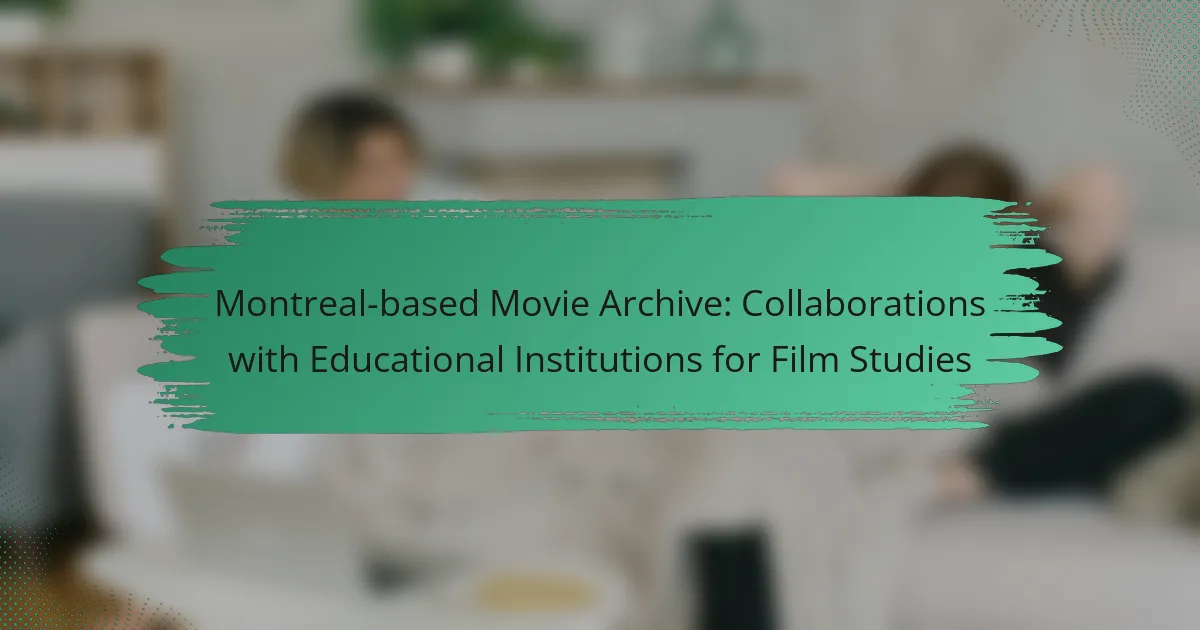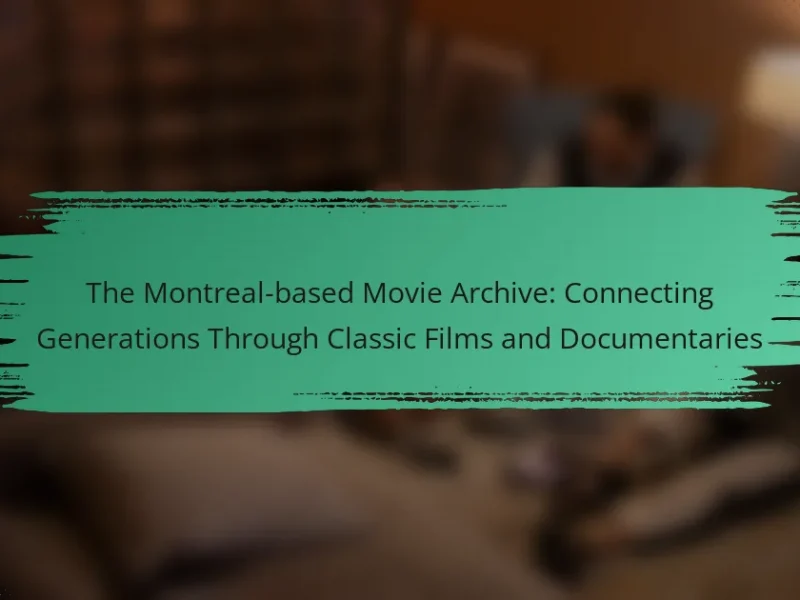The Montreal-based Movie Archive is a film preservation organization dedicated to collecting and archiving films significant to Canadian cinema. It collaborates with educational institutions to enhance film studies through access to its extensive collection, curated screenings, and educational programs. The Archive supports film scholars and students by providing resources for research and coursework, while also organizing workshops and seminars to deepen understanding of film history and preservation. These initiatives foster practical learning experiences and networking opportunities, ultimately enriching film education and ensuring the accessibility of important cultural heritage for future generations.

What is the Montreal-based Movie Archive?
The Montreal-based Movie Archive is a film preservation organization. It focuses on collecting and archiving films relevant to Canadian cinema. The archive aims to promote film studies and education. It collaborates with educational institutions for research and curriculum development. The organization provides access to a vast collection of films for academic purposes. It also supports film scholars and students in their studies. The Montreal-based Movie Archive plays a crucial role in preserving cultural heritage. Its efforts ensure that important films remain accessible for future generations.
How does the Montreal-based Movie Archive function?
The Montreal-based Movie Archive functions as a repository for film preservation and research. It collects, catalogs, and maintains a diverse range of films, including historical and contemporary works. The Archive collaborates with educational institutions to support film studies programs. This partnership facilitates access to archival materials for students and researchers. The Archive also hosts screenings and educational events to promote film literacy. It utilizes digital technology for cataloging and preserving films. The Archive’s resources are available to scholars, filmmakers, and the public. This ensures the preservation of cinematic heritage for future generations.
What types of films are included in the Montreal-based Movie Archive?
The Montreal-based Movie Archive includes a diverse range of films. This collection features classic cinema, contemporary films, and documentaries. Additionally, it encompasses independent films and international cinema. The archive aims to preserve films that have cultural, historical, or educational significance. It collaborates with educational institutions to enhance film studies. The inclusion of various genres supports a comprehensive understanding of film as an art form.
How is the collection curated and maintained?
The collection is curated through a systematic process involving collaboration with film scholars and institutions. Experts assess films for historical significance and educational value. The archive regularly updates its inventory based on new acquisitions and digital preservation efforts. Maintenance includes cataloging films and ensuring their proper storage conditions. This process follows best practices in archival science to protect against deterioration. Regular audits help to ensure the integrity of the collection. The archive also engages in outreach to enhance public access and awareness. These strategies ensure the collection remains relevant for educational purposes.
What role does the Montreal-based Movie Archive play in film studies?
The Montreal-based Movie Archive serves as a crucial resource for film studies. It provides access to a vast collection of films and archival materials. This access supports academic research and enhances curriculum development. The archive facilitates collaborations with local educational institutions. These partnerships foster practical learning experiences for students. Additionally, the archive hosts screenings and workshops. These events promote critical discussions on film theory and history. Overall, the archive enriches the educational landscape for film studies in Montreal.
How does the archive support academic research in film studies?
The archive supports academic research in film studies by providing access to a vast collection of films and related materials. Researchers can study primary sources, including rare films and documents. This access enables in-depth analysis of cinematic history and cultural contexts. The archive also facilitates collaboration with educational institutions. It offers resources for curriculum development and research projects. Workshops and seminars are organized to enhance research skills. Furthermore, the archive preserves films that are significant to Canadian cinema. This preservation ensures that important works remain available for future study.
What resources are available for students and educators at the archive?
The archive offers a variety of resources for students and educators. These include access to a vast collection of films and documentaries. Educational materials are available, such as study guides and lesson plans. Workshops and seminars are conducted to enhance learning experiences. The archive also provides online databases for research purposes. Additionally, there are opportunities for collaboration on film projects. These resources support film studies and promote educational engagement.

How does the Montreal-based Movie Archive collaborate with educational institutions?
The Montreal-based Movie Archive collaborates with educational institutions by providing access to its extensive film collection. This collaboration includes offering curated screenings for students and faculty. Educational programs often utilize the Archive’s resources for research and coursework. Workshops and seminars are organized to enhance film studies curricula. The Archive also partners with institutions for joint projects and events. These initiatives foster a deeper understanding of film history and preservation. Such collaborations support the academic community’s engagement with cinematic arts.
What types of collaborations exist between the archive and educational institutions?
Collaborations between archives and educational institutions include research partnerships, curriculum development, and internship programs. Research partnerships allow students and faculty to access archival materials for academic projects. Curriculum development involves integrating archival resources into film studies courses. Internship programs provide students with hands-on experience in archival practices. These collaborations enhance educational outcomes and promote the preservation of film history. Archives often host workshops and seminars for students, fostering a deeper understanding of archival methodologies. Additionally, joint events can be organized to showcase student projects utilizing archival materials. Such collaborations enrich the educational experience and support the mission of both entities.
How do partnerships enhance the educational experience for film students?
Partnerships enhance the educational experience for film students by providing access to industry resources and expertise. These collaborations often involve film archives, production companies, and educational institutions. They facilitate hands-on learning opportunities, such as internships and workshops. Students gain practical experience that complements theoretical knowledge. Access to professionals allows students to learn current industry standards and practices. Partnerships also enable networking opportunities that can lead to future employment. Research shows that students involved in such collaborations report higher engagement and satisfaction levels. Overall, these partnerships bridge the gap between academia and the film industry, enriching the learning process.
What specific programs or initiatives have been implemented through these collaborations?
The specific programs implemented through collaborations include film preservation workshops and educational seminars. These initiatives aim to enhance students’ understanding of film history and preservation techniques. The workshops provide hands-on experience with archival materials. Educational seminars feature industry professionals discussing contemporary film practices. Collaborative film projects have also been initiated, allowing students to produce films using archival footage. These programs are supported by partnerships with local universities and film schools. They foster a deeper appreciation for film heritage among students.
Why are collaborations important for the Montreal-based Movie Archive?
Collaborations are important for the Montreal-based Movie Archive because they enhance access to diverse resources. These partnerships with educational institutions provide valuable expertise in film studies. Collaborative projects often lead to the preservation of rare films and artifacts. They also facilitate research opportunities that benefit both students and the archive. For instance, joint initiatives can result in public screenings and educational programs. Such collaborations increase community engagement and awareness of film heritage. Ultimately, they contribute to the archive’s mission of preserving and promoting film culture.
How do collaborations increase access to film resources for students?
Collaborations increase access to film resources for students by providing shared networks and resources. Educational institutions partner with film archives to enhance curriculum offerings. These collaborations often lead to access to rare films and historical collections. Students benefit from workshops and training sessions organized through these partnerships. Collaborative projects may include joint film screenings and discussions. Access to industry professionals is also a significant advantage of these collaborations. Research indicates that students engaged in collaborative learning environments perform better academically. Such partnerships foster a richer educational experience in film studies.
What impact do these partnerships have on the local film community?
Partnerships between the Montreal-based movie archive and educational institutions significantly enhance the local film community. They provide students with access to valuable resources, such as archival films and expert knowledge. This collaboration fosters a deeper understanding of film history and theory among emerging filmmakers. Additionally, it creates networking opportunities between students and industry professionals. Workshops and seminars organized through these partnerships encourage skill development in various aspects of filmmaking. The local film community benefits from fresh perspectives and innovative ideas brought in by students. Overall, these partnerships contribute to a vibrant and dynamic film culture in Montreal.

What are the benefits of engaging with the Montreal-based Movie Archive for film studies?
Engaging with the Montreal-based Movie Archive provides numerous benefits for film studies. Access to a vast collection of films enhances research opportunities. Students can study rare and historical films not available elsewhere. The archive offers educational resources tailored for academic use. Collaborations with local institutions foster practical learning experiences. Workshops and seminars hosted by the archive deepen understanding of film preservation. These initiatives promote networking among students, professionals, and scholars. Engaging with the archive enriches film education through hands-on experiences. Overall, it supports a comprehensive understanding of film history and theory.
How can students leverage the archive for their studies?
Students can leverage the Montreal-based movie archive for their studies by accessing a vast collection of films and related materials. This archive offers resources that enhance film analysis and research. Students can utilize primary sources for assignments and projects. They can also participate in workshops and seminars hosted by the archive. Collaboration with educators ensures alignment with curriculum objectives. Additionally, students can gain insights into film history and production techniques. Access to rare films provides unique learning opportunities. The archive’s digital resources facilitate remote study and research.
What skills can students develop through interaction with the archive?
Students can develop critical research skills through interaction with the archive. They learn to analyze and interpret historical film materials. This process enhances their ability to evaluate sources for credibility and relevance. Students also gain technical skills in archival methods and preservation techniques. Engaging with diverse film formats fosters adaptability in using various media. They improve their communication skills by presenting findings and collaborating on projects. Additionally, interaction with the archive cultivates a deeper understanding of film history and cultural context. This comprehensive skill set prepares students for careers in film studies and related fields.
How does the archive enhance practical learning experiences for film students?
The archive enhances practical learning experiences for film students by providing access to a vast collection of historical films. This collection allows students to study various filmmaking techniques and styles. Film students can analyze the work of renowned directors and cinematographers. They gain insights into narrative structures and visual storytelling. Additionally, the archive offers resources for hands-on projects and assignments. Students can utilize original footage for editing exercises. Collaborations with educational institutions further enrich these experiences. Workshops and seminars led by industry professionals are often conducted at the archive. These initiatives bridge the gap between theory and practice, preparing students for careers in film.
What challenges might educational institutions face when collaborating with the archive?
Educational institutions may face several challenges when collaborating with the archive. One significant challenge is limited access to archival materials. Many archives have restrictions on their collections, which can hinder research efforts. Additionally, institutions may encounter difficulties in aligning their curriculum with the archive’s available resources. This misalignment can affect the quality of educational programs.
Another challenge is the potential for differing goals between the archive and the educational institution. Archives may prioritize preservation and access, while institutions focus on pedagogy and student engagement. These differing priorities can complicate collaborative efforts. Moreover, institutions might struggle with funding limitations, which can restrict their ability to engage in extensive collaborations or projects.
Furthermore, technical issues can arise, such as digitization challenges or the need for specific software to access archival content. This can create barriers for both educators and students. Finally, there may be a lack of familiarity with archival research methods among educators, making it difficult for them to effectively integrate archival resources into their teaching.
How can these challenges be addressed effectively?
Challenges in collaborations between Montreal-based movie archives and educational institutions can be addressed effectively through structured communication and resource sharing. Establishing regular meetings between stakeholders ensures alignment on goals and expectations. Developing joint programs can enhance curriculum relevance while providing students with practical experience. Creating digital platforms for resource access facilitates collaboration and information exchange. Implementing feedback mechanisms allows continuous improvement of partnership dynamics. Research indicates that successful collaborations often involve clear roles and responsibilities, fostering accountability. According to a study by the University of Montreal, structured partnerships improve student engagement and learning outcomes in film studies.
What best practices should educational institutions follow when engaging with the Montreal-based Movie Archive?
Educational institutions should prioritize collaboration, clear communication, and mutual benefit when engaging with the Montreal-based Movie Archive. Establishing formal partnerships can enhance access to resources. Institutions should also provide educational context for the materials used. This aids in maximizing the archive’s impact on film studies. Regular workshops and seminars can facilitate knowledge sharing. Institutions should also ensure proper attribution of archive materials in their projects. Engaging students in hands-on projects with the archive fosters practical learning. Finally, feedback mechanisms should be implemented to improve future collaborations.
The Montreal-based Movie Archive is a film preservation organization dedicated to collecting and archiving films significant to Canadian cinema. This article outlines how the Archive collaborates with educational institutions to enhance film studies through access to a diverse film collection, workshops, and research opportunities. Key topics include the Archive’s role in supporting academic research, the types of films included in its collection, and the benefits of partnerships for students and educators. Additionally, the article addresses challenges faced in these collaborations and best practices for effective engagement.


